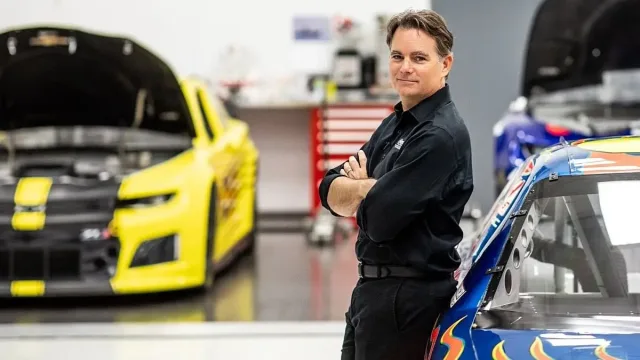Jeff Gordon’s 4-second rule controversy has sparked debates among NASCAR fans for years. Was there a secret plan to slow him down? Whispers suggest caution flags appeared when his lead grew too large. Some say it was just racing luck, while others believe officials controlled the show. While no proof exists, the claims raise big questions about fairness and entertainment in NASCAR. Did the sport truly step in to keep things exciting?
Key Highlights
- The “4-Second Rule” suggests NASCAR intervenes if Jeff Gordon’s lead surpasses four seconds to maintain competitive balance.
- Speculation claims caution flags were used to prevent Gordon from having excessively large leads, especially in the late 1990s.
- Allegedly, NASCAR advised Gordon’s team to limit leads for entertainment, raising questions about race integrity.
- Jeff Gordon acknowledged NASCAR’s dual focus on competition and entertainment for the sport’s sustainability.
- Gordon’s strategic racing approach and career success significantly influenced NASCAR’s appeal and operational practices.
The Legend of Jeff Gordon’s “4-Second Rule” in NASCAR
Although Jeff Gordon‘s name is synonymous with NASCAR excellence, the “4-Interval Rule” remains a topic of intrigue and debate among racing enthusiasts. The concept, while never officially documented, suggests a covert intervention by NASCAR officials to maintain competitive balance during races dominated by Gordon.
At the height of his career in the late 1990s, Gordon’s formidable skill often saw him gaining notable leads, sparking theories of manipulation. Specifically, the “4-Interval Rule” posits that should Gordon extend his lead beyond four seconds, NASCAR might deploy a caution flag, ostensibly to boost race excitement.

This unwritten directive was said to equalize competition, ensuring tighter races and preserving viewer interest. While no concrete evidence substantiates these claims, the persistence of such rumors highlights the enigmatic charm surrounding Gordon’s dominance.
The time NASCAR told Gordon to slow down. Thread 🧵🧵🧵 pic.twitter.com/9XkF3TWrNv
— FIVE WIDE Sports (@FiveWideSports) February 8, 2025
Speculation Surrounding NASCAR’s Alleged Intervention
Speculation surrounding NASCAR’s alleged intervention in Jeff Gordon‘s races has persisted for years, driven by observations of calculatedly timed caution flags during his most dominant performances. Many fans, competitors, and analysts have questioned the integrity of these actions, especially during Gordon’s remarkable 1997-1998 seasons.
The notion of a “4-Second Rule” stems from NASCAR officials purportedly advising Gordon and his team to limit their lead to maintain viewer interest. This alleged directive from Bill France Jr., as recounted in a thread by Five Wide Sports, suggested that Gordon’s dominance could detract from the sport’s entertainment value.
While NASCAR has never officially acknowledged such a rule, the theory remains a point of contention. Observers point to the timing of caution flags as evidence of possible manipulation.
Ultimately, the controversy highlights the tension between ensuring fair competition and enhancing audience engagement, raising questions about the sport’s authenticity and competitive integrity.
Jeff Gordon Acknowledges NASCAR’s Entertainment Focus
Jeff Gordon, a legendary figure in NASCAR, has openly recognized the intricate balance between the sport’s competitive spirit and its entertainment value.
Jeff has talked about it a couple of times but here is a short clip of him touching on it: pic.twitter.com/PC8Jtas8Fi
— FIVE WIDE Sports (@FiveWideSports) February 8, 2025
His reflections reveal a nuanced understanding of NASCAR’s dual nature as both a competition and an entertainment product. Gordon acknowledged the importance of maintaining viewer engagement, pointing out that NASCAR couldn’t afford to have races “stinking up the show.” His insights highlight how the sport must captivate audiences to remain viable.
Gordon recounted a conversation emphasizing this entertainment focus: “This is racing, but this is a sport, an entertainment sport. And so what happens on the track, if it’s not entertaining, people aren’t gonna wanna watch it.”
“This is racing, but this is a sport, an entertainment sport. And so what happens on the track, if it’s not entertaining, people aren’t gonna wanna watch it. Ray got, had a conversation with someone. They said, listen boy, y’all are stinking up the show.”
“And that’s not good for NASCAR. You need to be thinking about that. And so we had that conversation. So we actually, we had a signal in the car. If I had a big lead, they would say, okay, one second lead. All right, two second lead. Three second lead. All right, Jeff, you’re at four seconds.” – Jeff Gordon
He mentioned a practice where his team would alert him to slow down if his lead became too large, illustrating how entertainment considerations impacted racing strategies.
Consequently, Gordon’s acknowledgment emphasizes a critical aspect of NASCAR’s operational ethos, balancing competition with viewer appeal.
Jeff Gordon’s Lasting Impact on NASCAR
Gordon’s acknowledgment of NASCAR’s entertainment aspects provides a backdrop to understanding his enduring impact on the sport. Jeff Gordon, a figure synonymous with the rise of modern NASCAR, revolutionized the sport through both skill and charisma.
His record of 93 career victories in the modern era places him third in the all-time Cup wins list, a proof of his dominance and influence. Gordon’s success with Hendrick Motorsports, driving the No. 24 Chevrolet, showcased the blend of talent and team excellence necessary for long-term success in NASCAR.
Gordon’s tactical approach and adaptability contributed to NASCAR’s evolution, making it more appealing to a broader audience. His legacy remains a benchmark for emerging racers and a catalyst for tactical innovation in the sport.
News in Brief: Jeff Gordon’s 4-Second Rule Controversy
Jeff Gordon’s acknowledgment of NASCAR’s focus on entertainment highlights the complex dynamics within the sport, where competition intertwines with showmanship. The “4-Second Rule” controversy emphasizes the tension between maintaining racing integrity and enhancing spectator appeal.
While NASCAR’s alleged interventions remain speculative, the situation illuminates the challenges faced in balancing sport and spectacle. Gordon’s legacy, marked by skill and influence, continues to shape NASCAR, prompting ongoing discussions about the sport’s evolution and the role of regulatory decisions in racing.
ALSO READ: Jeff Gordon Joins NASCAR and IndyCar’s Icons for a Legendary Race


